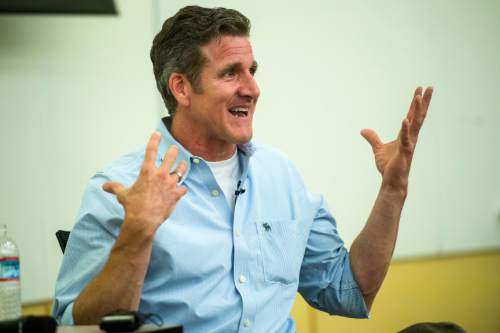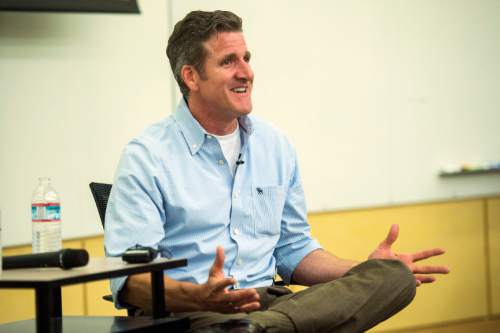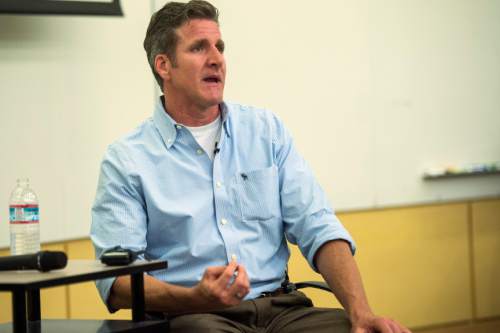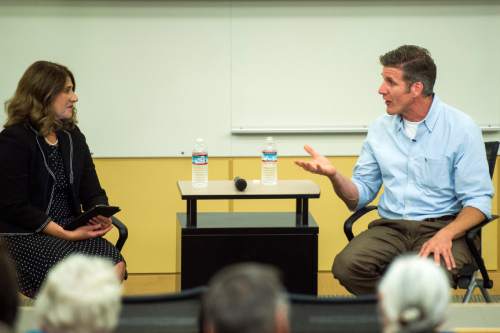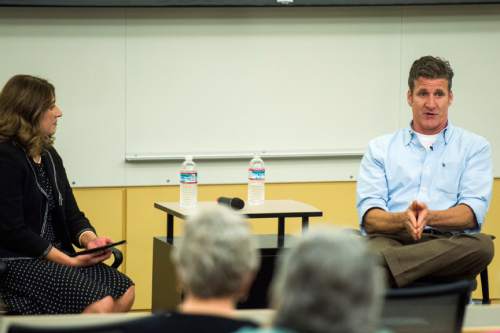This is an archived article that was published on sltrib.com in 2016, and information in the article may be outdated. It is provided only for personal research purposes and may not be reprinted.
Before she died in 2014, Brittany Maynard told her husband, Dan Diaz, to finish the plans they had made together before she was diagnosed with brain cancer.
"I was not to get stuck just mourning the loss of my wife," Diaz said.
The couple had moved from California to Oregon so Maynard could take advantage of the state's Death With Dignity law, which allows terminally ill patients to obtain and self-administer life-ending prescriptions.
Maynard's public advocacy made her the face of America's right-to-die movement, which seeks the legalization of fatal prescriptions.
A terminal diagnosis throws a patient's life into chaos, Diaz said, but right-to-die legislation allows people to take back control over their lives and experience a comfortable death on their own terms.
"This does not result in more people dying," Diaz said. "It simply results in fewer people suffering."
Diaz is in Utah this week, meeting with lawmakers and community groups on the subject of medical aid in dying.
California became the fifth state to legalize the practice last week, and similar legislation has been sponsored in several states, including Utah.
Diaz, speaking with members of the League of Women Voters on Tuesday night at an event at the University of Utah, said polls show that public support is growing, and he is optimistic that a ballot initiative in Colorado could make a sixth right-to-die state by the end of this year.
"There's a little bit of therapy in it for me," he said of his continued advocacy efforts. "I'm keeping my promise to Brittany."
In Utah, Rep. Rebecca Chavez-Houck, D-Salt Lake City, is the sponsor of the End of Life Options Act, which would create a legal pathway for terminal patients to obtain fatal prescriptions.
A version of the bill has been sponsored in the past two legislative sessions, with members of the House Health and Human Services Committee twice voting to hold the proposal for interim study.
That vote means another year, at least, before the bill can become law.
Chavez-Houck said it's critical that lawmakers hear from terminally ill patients. But many who support her bill are living in pain, and dying, waiting for the Legislature to act.
"Their journeys are going to end within a relatively short time," she said. "We need more people to step forward."
The news organization Vox estimates that with California's law taking effect last week, 1 in 6 Americans live in a state where it is legal for doctors to prescribe fatal treatments.
But controversy remains, with many groups likening right-to-die laws to euthanasia and physician-assisted suicide.
In Utah, the bill is opposed by the Catholic Diocese of Salt Lake City, according to Jean Hill, government liaison for the diocese.
"We've got very serious concerns about any bill that tells people suicide is the answer to their problem," she said.
Data from states like Oregon is minimal, Hill said, and it is not yet clear what adverse consequences could result from legalizing fatal prescriptions.
She gave the example of insurance companies that might decline to cover hospice care when the cheaper solution of a suicide pill is available.
A person has a right to refuse medical treatment, Hill said, but a line is crossed when doctors proactively offer a treatment that leads to death.
"Medical reform should be about improving the lives of individuals," she said. "Not taking their life."
But Diaz said it is inaccurate to describe his late wife as suicidal, or classify her actions as suicide, even physician assisted.
The laws include several levels of safeguards — like required mental health evaluations and independent prognoses by two doctors — which he said protect against the kind of hypothetical abuse Hill and other opponents describe.
"The term 'suicide' has nothing to do with this program," he said. "A suicidal person is somebody who wants to die. My wife, Brittany, wanted to live."
Diaz said he respects that many religious people will object to the practice of medical aid in dying.
But he said respect should also be extended to patients to make decisions for themselves, based on their own beliefs and wishes.
"As a Catholic," he said, "I don't think it's my job to judge anyone else for the decisions they might make regarding their end of life."
He is expected to testify to the House Health and Human Services Committee on Wednesday, and Chavez-Houck said an additional hearing on the End of Life Options Act is scheduled for the committee's July meeting.
"Last year, we maybe dedicated, at the most, a half an hour [to the bill]," Chavez-Houck said of interim hearings. "This time, we're going to get into it a little bit more deeply."
Twitter: @bjaminwood


